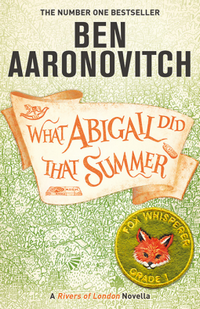 |
What Abigail Did That Summerby Ben Aaronovitch eARC, 232 pg. Read: March 1, 2021 |

There are a few, uh, provisos, a, a couple of quid pro quos.
I almost feel like I need to go back and do a lot of re-reading before writing much about this book. I’d have thought that Abigail’s involvement with the Folly and Peter wasn’t this developed until later in the series.
Also, I know there’s a connection between Abigail and the talking foxes, but I don’t remember exactly when it comes about and how much of this book is Aaronovich filling in the backstory that he just breezes past in one of the novels.
I didn’t feel at a loss for context while reading the book, but I tell you what, I’m feeling it as I try to talk about the novella. So, I guess I’m saying, be nice and forgive any lapses in what’s to come:
What’s What Abigail Did That Summer About?
This novella is set during the events of Foxglove Summer and Peter’s not in London. But never fear, Abigail does talk to Nightingale a couple of times.
Abigail has a strange interaction with someone she used to know and sees someone else acting slightly strangely. She starts, not really investigating, but taking a close look around at everything. Then when the police start asking questions of kids in the park, showing pictures of those same people, she knows something’s up.
Not that she tells the police that, because they’re not going to believe her. She’s told that these children (and others) have gone missing, but then reappear at home, with fuzzy memories of the last couple of days. If Abigail, she thinks, with the help of some of the local talking foxes, can figure out what’s going on, she can point Nightingale in the right direction—which might help convince him that she’s ready for training.
But mostly, Abigail’s curious about what’s happening and has to figure it out.
Postmartin’s Contribution
Abigail’s first-person account is littered with footnotes by the Folly’s archivist, Harold Postmartin. Largely, these footnotes are to explain some of the more slang-y terms Abigail uses (although sometimes it’s a more technical note). He seems to go to great lengths to make sure that American readers can get what she’s saying. I halfway wonder if in UK editions those notes have differences.
I think I could’ve worked out the terms I wasn’t already familiar with, but the footnotes were entertaining enough that it doesn’t matter if I could’ve. This was a better way to deal with it.
So, what did I think about What Abigail Did That Summer?
This is absolutely a Folly-story, one that belongs in this series, but there’s no way that Peter Grant was the right character to use for this story, Aaronovich needed to use someone like Abigail to tell this, conveniently enough, there she was. She has a different way of thinking than Peter—and while there’s humor to her narration, it’s not the same as Peter’s (even if it’s occasionally similar). Seeing things from her perspective, it’s a great way to see how she’s similar to her cousin, while very much being her own person.
Frequently, with novellas, I walk away wondering why couldn’t we get a full novel out of it? This isn’t one of those times—the story is as long as it needs to be—it’s complex and satisfying. Also, we get a lot of development out of Abigail and get a better degree of understanding of her than we’ve had before.
That said, there are just so many things I want to know more about, but just making this novel-length wouldn’t take care of it. For example, we learn right off the bat that there’s something…different…about Simon’s mom—and Aaronovich teases us with a couple of more things. I want more of this. I want to know just what it is that Abigail’s doing for her. I want more adventures with Abigail and the foxes.
I’ve always wanted to see more Abigail in the novels—this underscores that for me.
In short, this was a fun story—a strange one at times, but fun—that makes me more curious about a character I already enjoyed, but now I want more of her—both on her own (like this) or in the main novels. I had a similar reaction to the novella The October Man, too. Although that probably is my reaction to anything in this universe (at least so far)—”I enjoyed that, can I have more like it?”
This would be an interesting jumping-on point for the whole series—I’m not sure I’d recommend it, but it might be enough to convince you to dive into the rest.
Disclaimer: I received this eARC from Subterranean Press via NetGalley in exchange for this post—thanks to both for this.

![]()



1 Pingback